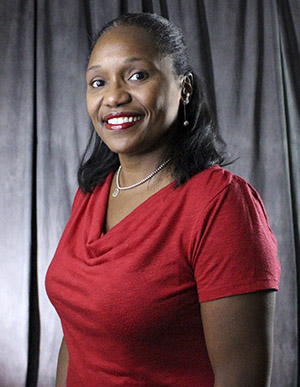
As president of the University Council for Educational Administration, April Peters-Hawkins is helping shape the training of school leaders as well as public policy.
From middle school teacher to principal to college professor, April Peters-Hawkins has an in-the-trenches view of urban education. Now, as president of the University Council for Educational Administration, she’s helping shape the training of school leaders as well as public policy.
Peters-Hawkins joined the University of Houston College of Education in August 2016 as associate professor and director of the Doctor of Education program in the Department of Educational Leadership and Policy Studies. Passing up a job in corporate America, she got her start in teaching in New Jersey through Teach for America. “I say that proudly, although there’s a lot of discontent with TFA in a lot of ways,” she says, “and I understand that.”
Peters-Hawkins later worked as a high school principal in Baltimore and joined the University of Georgia in 2006 as an assistant professor. She said she was drawn to the Houston job because it offered an opportunity to be embedded in one of the nation’s largest, most diverse cities as she helped build the doctoral program. (The warm climate helped, too.)
Between meetings, Peters-Hawkins took a break to reflect on her journey and the biggest issues in education today.
Becoming a teacher: “I fell in love with teaching. I actually went into it because I wanted to be with kids all day. I ended up immediately falling in love with the idea of teaching and learning, how those things are reciprocal.”
Preparing educational leaders: “One issue we struggle with as a profession is figuring out how to effectively educate and support scholar practitioners. As we issue doctorates, we’re used to preparing scholars and researchers. We’re actually preparing people who are boots on the ground. One of the things we should be mindful of when we prepare scholar practitioners is how we engage them in the research process.”
Merging research and practice: “One of things we did at UGA was engage students in action research. In other words, their school site was a space for data collection. We wanted them to develop a skillset for identifying problems of practice, identifying means to collect data, figuring out how to interpret data and writing that up. That’s marrying the idea of what happens in practice with the research goals of academia. It’s not always a seamless process. I think we’ve gotten a lot closer.”
Leading UCEA, a consortium of higher education institutions working to advance educational leadership: “I would like to see the organization continue to do the good work it’s doing, to continue to be a presence at the policy table. UCEA has moved in a direction of being more vocal – around issues surrounding social justice and equity but also in terms of how do we diversify faculty and support people through the professoriate.”
Confronting the challenges in K-12 education: “My experience is specific to urban contexts, and I think in that space there are a lot of issues. Often the kids who need the most get the least. But there are these expectations around accountability, so the bar is the same for everybody. Most of us growing up didn’t grow up with those same rigorous accountability standards, and we turned out just fine. I think the way we’ve defined achievement is very narrow. It’s demolished the ability to see genius in ways beyond math and English and science. The kinetic, the musical or other ways in which we’re talented, they’re very much devalued.”
Understanding the universality of leadership: “I have this conversation with my students all the time. We use a lot of examples from political leaders, military leadership and business in my classes because the concepts around leadership are fairly transferable from context to context. Certainly the fact that we work with children creates nuances we have to be aware of.”
–By Ericka Mellon